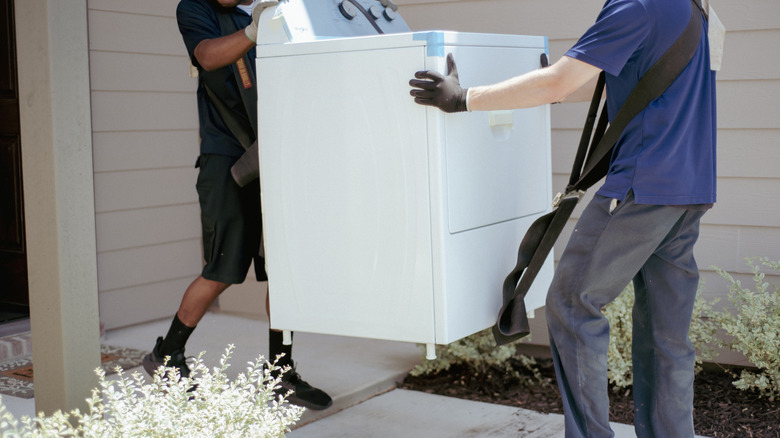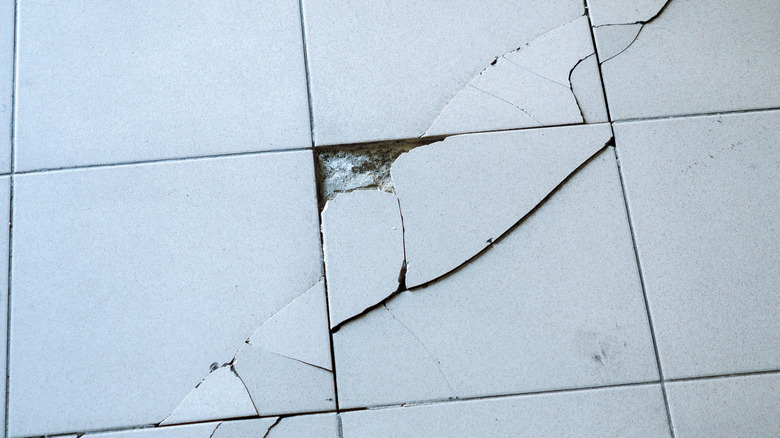The Big Downside To Taking Appliances With You When You Move
Selling a home and moving is a whirlwind experience for many of us, leading to many people relying on a handy-dandy essential moving checklist. This list is a literal lifesaver as we are looking for homes, packing up our current ones, and moving into the next one. As you begin to check tasks and items off, you'll eventually come across buying or taking your larger appliances like refrigerators, washers, cooking ranges, ovens, and dryers. But don't pack up yours just yet. This is because the big downside to taking appliances with you when you move is the unpredictable damage that may occur and the potential financial impact that comes with it.
Buying a new home is expensive enough as is, but when you consider purchasing new appliances on top of that, you'll need to tack on an average cost of about $2,100 to $5,400. While it can vary, some people can easily find themselves spending tens of thousands, especially if they go for luxury picks, like JennAir and Viking. Therefore, we understand wanting to keep your larger appliances, especially if you still have payments, want to save money, your new home doesn't have any, or you just absolutely adore them. While you can uninstall, disconnect, and reinstall many of these items on your own, there is always a chance something can go wrong; therefore, it's crucial to understand the potential damages and high financial costs that may come with it.
Moving appliances is hard work and can cause damages
Moving your large appliances can cause damage to your home or even the appliance itself. Hard, manual labor and the possibility of getting hurt, especially when handling heavy objects like your appliances, come with moving. Since many of these home essentials can easily weigh hundreds of pounds, it is not recommended to move them on your own, or you may suffer physical issues like knee, back, and shoulder strain. Even if you follow the best hack to make moving your bulky furniture easier, serious injuries can still happen, resulting in continued therapy and medical procedures. And to make matters worse, while you are accidentally hurting yourself, you can be damaging the appliance, the house you are selling, or even your new home.
During the moving process, it's common for those larger items to leave dents, tears, or scratches on surfaces throughout the home — your floors, cabinets, door frames, and walls could all become victims. While some repairs can be an easy, affordable fix, more extensive problems can occur, leading to time schedule changes, additional repairs and costs, and potentially the cancellation of a sale. Many appliances use gas, water, and electrical components, requiring careful disconnection, removal, and reconnection. One wrong move can lead to gas and water leaks and other potential hazards. Even if it doesn't create those issues, there is also the potential that improper disconnection can lead to the appliance never working again.
Taking your appliances could cost you a lot of money
Taking your appliance can cost you more than you think. And while the important step you need to remember when planning a move is setting a budget, there are many high costs that come with it, like moving services, cleaning fees, packing materials, storage, new furniture and appliances, and down payments and security deposits. Before you know it, you can easily spend thousands of dollars, leading you to mitigate additional costs by packing your larger appliances into your next home. However, this move can jeopardize the overall sale of your home. Adding appliances to your home can increase the value, thus getting a higher selling point. Since updated, newer appliances are more appealing to prospective buyers; removing these tools can decrease that selling point. Therefore, before you even think about taking the appliances, always notify the prospective buyers, just in case you need to negotiate or change pricing.
If you decide to move your appliances, it's important to know that you may be responsible for any damages that happen during the move before closing, meaning you must financially cover and handle the fixes that must be done. If you do move your appliances and the area incurs any problems or concerns, immediately contact the potential buyer, letting them know the situation and providing photos and videos. From there, the two parties will find an agreeable way to resolve the problem, whether that is through insurance or ending the sale.


